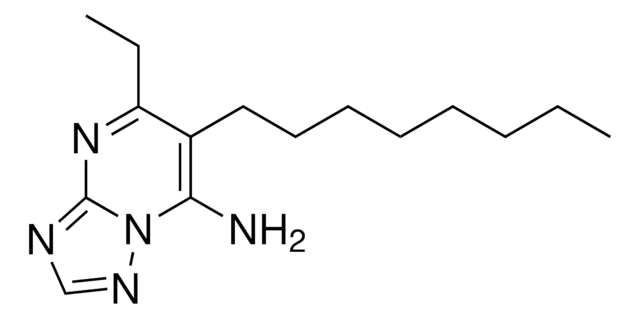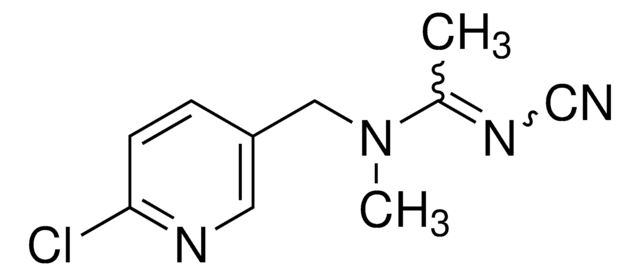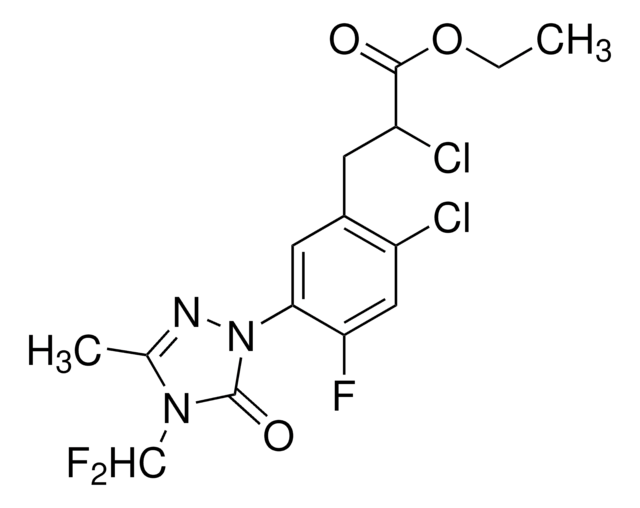93683
Ametoctradin
certified reference material, TraceCERT®, Manufactured by: Sigma-Aldrich Production GmbH, Switzerland
Synonym(s):
5-Ethyl-6-octyl[1,2,4]triazolo[1,5-a]pyrimidin-7-amine
About This Item
Recommended Products
grade
certified reference material
TraceCERT®
Quality Level
product line
TraceCERT®
shelf life
limited shelf life, expiry date on the label
manufacturer/tradename
Manufactured by: Sigma-Aldrich Production GmbH, Switzerland
storage temp.
−20°C
SMILES string
CCCCCCCCc1c(CC)nc2cnnn2c1N
InChI
1S/C15H25N5/c1-3-5-6-7-8-9-10-12-13(4-2)19-15-17-11-18-20(15)14(12)16/h11H,3-10,16H2,1-2H3
InChI key
GGKQIOFASHYUJZ-UHFFFAOYSA-N
Looking for similar products? Visit Product Comparison Guide
Related Categories
General description
Ametoctradin is a fungicide that belongs to the class of triazolo-pyrimidylamines in FRAC group 45. Ametoctradin is a mitochondrial respiration inhibitor that binds to the complex III (complex bc1) in the electron transport chain of oomycete pathogens, causing a rapid decrease in oxygen consumption and intracellular ATP levels. It is effective in controlling late blight and downy mildews in potato, grape, cucumber, apple, tomato, and other crops.
Ametoctradin has to be monitored in the Multiannual Control Programmes for Pesticides Residues (MACP), run within the EU and EFTA in/on products of plant origin.
Ametoctradin is approved for its use in the EU under Reg. (EC) No 1107/2009. Maximum residue levels (MRLs) have been set according to Reg (EC) No 2021/1110 for ametoctradin for various products of plant and animal origin from 0.01 to 60 mg/kg.
Application
Ametoctradin CRM may also find its use as described below:
- QuEChERS method to analyze ametoctradin residue in apple, cucumber, cabbage, tomato, and grape using UPLC-MS/MS.
- Comparative study of three sample preparation methods for multi-residue extraction of pesticide residues analysis in hop matrix.
- Simultaneous and rapid analysis of 300 pesticide residues in human hair using LC-MS/MS and GC-MS/MS.
- To determine the behavior of field-applied pesticides in barley during the malting and mashing stages of beermaking.
- To study the effect of new generation fungicides on Saccharomyces cerevisiae growth, grape must fermentation, and aroma biosynthesis.
Recommended products
Legal Information
signalword
Warning
hcodes
Hazard Classifications
Acute Tox. 4 Oral
Storage Class
11 - Combustible Solids
wgk_germany
WGK 3
flash_point_f
Not applicable
flash_point_c
Not applicable
Choose from one of the most recent versions:
Certificates of Analysis (COA)
Don't see the Right Version?
If you require a particular version, you can look up a specific certificate by the Lot or Batch number.
Already Own This Product?
Find documentation for the products that you have recently purchased in the Document Library.
Our team of scientists has experience in all areas of research including Life Science, Material Science, Chemical Synthesis, Chromatography, Analytical and many others.
Contact Technical Service








